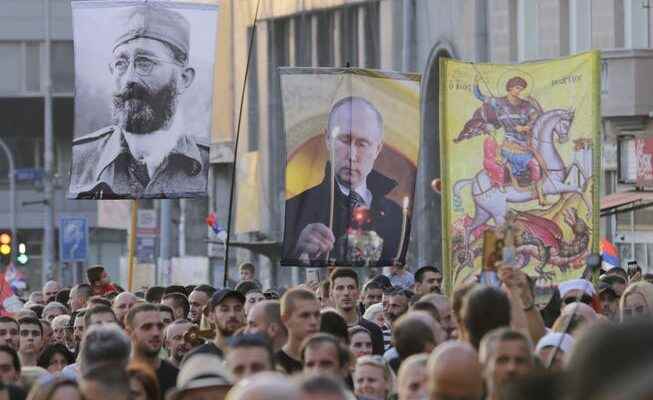The Serbian government wants to block a long-planned major event for the rights of sexual minorities. The outrage is great.
Protest march in Belgrade against Europride, an event for gay rights. Chetnik leader Draza Mihajlovic and Putin can be seen on the banners as “icons” of the homophobic protest.
Aleksandar Vucic is a master of the political balancing act. For years now, the Serbian president has presented himself to the West as a reliable partner in the European integration process, in Moscow as a pan-Orthodox ally and at home as the keeper of true Serbness. The past weekend provided plenty of illustrative material for this.
Diversionary tactics for the Kosovo deal
In the dispute with Kosovo, whose independence Belgrade does not recognize, a first breakthrough was achieved on Saturday. In the future, Serbia will accept Kosovan identity documents for entry into its territory. The government in Pristina had threatened that otherwise it would no longer recognize Serbian documents.
Belgrade emphasizes that this is not an implicit recognition of statehood. Nonetheless, the latest development is an important milestone towards a normalization of relations between the two seeds. Kosovo’s Prime Minister Albin Kurti has prevailed over Vucic with his insistence on the principle of reciprocity and has thus achieved a significant stage victory.
Probably also to appease national-conservative circles in view of this alleged taboo breach, Vucic announced at the same time that the so-called Europride would not be held at the planned time in September.
This is a multi-day event with participants from all over Europe, where the rights of homosexuals and other sexual minorities are promoted through various events, including a big parade. This year Europride is to take place in Belgrade, also as a sign of solidarity with the still difficult situation of homosexuals in the country and in the region. According to Goran Miletic, one of the organizers of Europride, more than half of the Serbian population considers homosexuality an illness.
Gay Prime Minister defends rejection
If Vucic speculated that the cancellation would be quietly acknowledged given the progress made on the Kosovo issue, he was wrong. On Sunday, two experts on the rule of law situation in the Balkans, the Green MPs Viola von Cramon and Terry Reintke, flew from the European Parliament to Belgrade, where they met acting Prime Minister Ana Brnabic.
The fact that Brnabic, who is openly in a lesbian relationship, was asked by Vucic to form a new government on the weekend when Europride was canceled seems almost ironic. Vucic has long used the prime minister as a fig leaf to signal open-mindedness and cosmopolitanism.
Despite its constitutional rights, Brnabic has little leeway. All important decisions are made in the Presidential Palace. The only thing left to the government is enforcement.
Despite her own homosexuality, Brnabic also defends the decision against Europride. The new regulation with Kosovo and the regionally simplified border traffic pose such challenges that Serbia cannot guarantee the safety of the Pride participants, explained Brnabic. There are also threats from right-wing extremists against the event.
The violent attacks at the Belgrade Pride marches in 2001 and 2010, when dozens of people were injured, resonate implicitly. However, hardly anyone doubts the ability of the Serbian police to ensure security – if there is the political will to do so.
Criticism from the West and from the opposition
In the meantime, numerous other voices have spoken. 145 MEPs on Wednesday an open letter to the Serbian government written and demanded a safe execution of the Europride. The representatives of the EU and the UN in Belgrade also made similar statements. Serbia’s status as an EU candidate also plays a role here. In view of the uncertain prospects of accession, however, warnings of negative consequences for the integration process have long since lost their terror.
The pro-European opposition in Serbia has also criticized the government’s decision. Several parties have called for a protest event on September 17 if the Pride parade planned for that day does not actually take place. It is also about freedom of expression in general, explains Biljana Djordjevic, a member of parliament from Ne Davimo Beograd, in an interview. The citizens’ initiative, which has been represented in the national parliament since the last elections, already showed solidarity with the environmental protests last winter.
Djordjevic assumes that Europride will take place anyway, maybe even with more participants than originally expected. “The side events are not up for debate anyway,” says the politician. “And there are still two and a half weeks left for the parade to find a solution with the government.” Goran Miletic from the organizing committee also told the NZZ that all events would be held as planned.
«Proxy war on Serbian soil»
President Vucic has so far been unyielding. He will stand by his decision even if Biden or Putin calls him, he said on Tuesday. In fact, he is also under pressure from the right. The nationalist opposition party Dveri announced a counter-demonstration for September 17 should the Europride parade then take place.
Thousands had already protested against the event in Belgrade on Sunday. In addition to religious and nationalist symbolism, Russian flags and posters with Vladimir Putin were also on display. Sympathy for Russia is great in nationalist circles in Serbia. Vucic also knows how to use these feelings skillfully.
On Tuesday, however, he spoke of a proxy war between West and East that would be fought on Serbian soil. The Serbian president is even better at presenting his country as a victim of obscure superpower games and as the only guarantor of stability than the political balancing act. So far he’s always gotten away with it.
